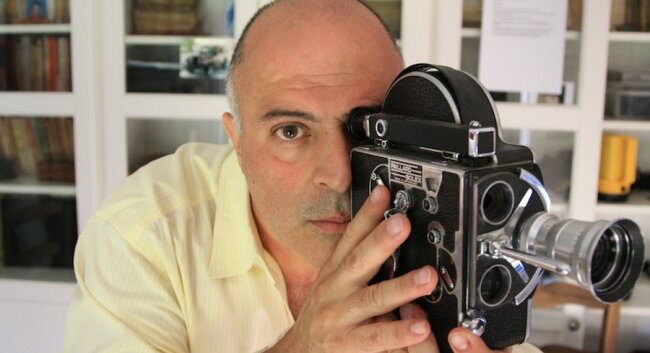Revolutionary: How to film upheaval-- and pick up girls
The filmmaker was living in Argentina in the 1970s, a tumultuous and dangerous place that saw the return of General Juan Perón in 1973, the reign of his widow Isabel Perón, her ouster in a military coup, and the military junta responsible for an estimated 11,000 people secretly abducted, imprisoned, or killed, who have come to be known as the Disappeared.
"The revolution was part of the popular culture," says Eduardo Montes-Bradley, pulling out the World War II-era camera he used in Argentina.
"Women were crazy for filmmakers– listen to this," he says as a visitor hears the whir that movie cameras used to make when filming. "It was sexy."
Montes-Bradley, 52, is still making films, most recently, Julian Bond: Reflections From the Frontlines of the Civil Rights Movement.
How many films? "I don't know," he replies, and hazards a guess of over 60. "That would make me feel irresponsible if I count them because no one should make that many," he says.
His filmography is full of documentaries on figures such as Che Guevara, Eva Perón, and Jorge Luis Borges– and a few feature films.
"I haven't been successful as a commercial filmmaker," he says. "That gives me freedom."
Montes-Bradley works differently from American independent filmmakers. For example, he doesn't raise money before starting a project. He also doesn't make the film festival rounds– except for the Virginia Film Festival– and he doesn't do promotion.
"I go to the next project," he declares. "Once finished, I'm done. I don't want to hear about it."
He ended up in the western Albemarle community of Ivy because, like many parents, Montes-Bradley wanted a community with good public education. "I visited many places in this country," he says. "And in Europe and Central America. We traveled for five years looking with the children."
Then he changed the question from "Where do I want to live?" to "Where do I want to die?"
He'd been to Charlottesville before in 1999 to show his film Borges at UVA, and remembers a small rural town. When he came back to check it out three years ago, "I felt immense relief and overwhelming peace," he recounts. "I thought, [expletive], it's a good place to die.'"
Montes-Bradley has finished the Julian Bond movie, but came up a little short on funding for the rights to add music and photos, so is using Kickstarter to raise $24,000 by October 17 to finish the film, which will premiere at this year's Virginia Film Festival.
"Eduardo brings experience and sympathy to his work as a documentarian," says Bond. "I am flattered to have been chosen as his subject."
And typical of Montes-Bradley's style, he immediately leapt into a new film, this one on UVA poet Rita Dove, for the production of which he's spent quite a bit of time studying her work and literary criticism. "I feel like I was passing an exam," he says.
These days, Montes-Bradley has another motive for making films. "I became a father late in life," he says. "If the films help [my children] understand the world I lived, it helps them be closer. Whether I'm here or not, I've established that bridge in time."

2 comments
Why would he move here I thought our schools were terrible when compared to other countries?
He's 52 now, so he was a young teen making films in Argentina?